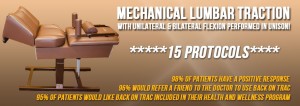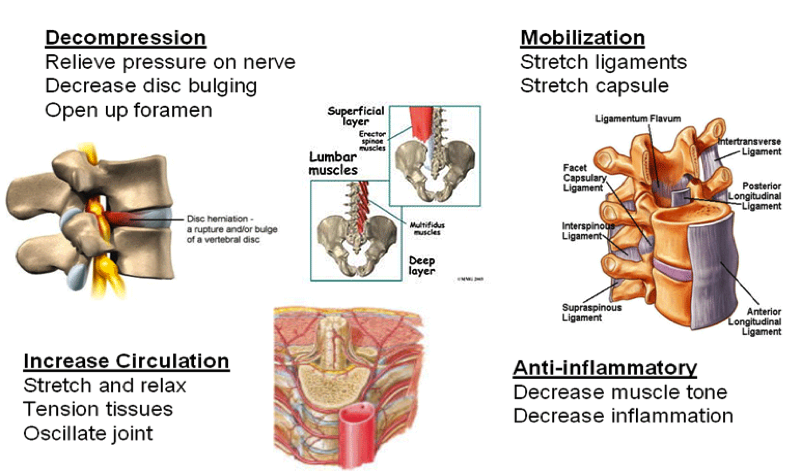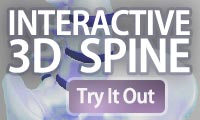The Chiropractic Clinic Now Offering Lumbar Mechanical Traction
Monday, August 26th, 2013MECHANICAL LUMBAR TRACTION WITH UNILATERAL & BILATERAL FLEXION

BACK ON TRAC™ provides a gentle and safe mechanical traction to the lumbar spine without all of the restraints and weight. The 15 factory protocols allow for multiple combinations of unilateral and bilateral static and intermittent traction with length and degree settings
The ergonomically correct chair design allows you to comfortably start from a seated position
With the press of a button, BACK ON TRAC™ safely moves you into supine position with your pelvis and knees in the correct position for the session
BACK ON TRAC™ has no cumbersome restraints allowing for a very comfortable, relaxing therapy session
Effects of Lumbar Mechanical Traction
What Can BACK ON TRAC™ do for you?
Reduce pain and increase Range Of Motion
Vertebra Separation, which may decrease intradiscal pressure and reduce bulging of nuclear material
and may reduce bulging of nuclear material, and may enhance osmosis from vertebral endplates,
increasing fluid/blood supply to discs.
Separation and gliding of the facet joints, establishing potential for the improved alignment, articulation, and joint mobility.
Tensing, if not stretching of the system of spinal ligaments.
Widening of vertebral foramina, allowing increased space for spinal nerve roots.
Straightening of spinal curves
Stretching of the spinal musculature, potentially decreasing its sensitivity to stretch and therefore decreasing muscle spasms/guarding. It is also possible that this stretch may improve blood supply to posterior soft tissues.
Indications for Lumbar Mechanical Traction

Spinal nerve root impingement:
Bulging and Herniated disc
Ligament encroachment
Narrowing of the intervertebral foramen
Osteophyte encroachment
Spinal nerve root swelling
Spondylolisthesis
Joint hypomobility
Degenerative joint disease
Extrinsic muscle spasm and muscle guarding
Discogenic pain
Joint pain
Compression fracture
Contraindications for Lumbar Mechanical Traction
Acute joint sprains, strains and inflammation
Spinal instability and general joint hyper mobility
Spinal Acute Fractures
Spinal Cancer
Pregnancy
Osteoporosis
Hiatal hernia
Bilateral neurological signs – may indicate a cord compromise
